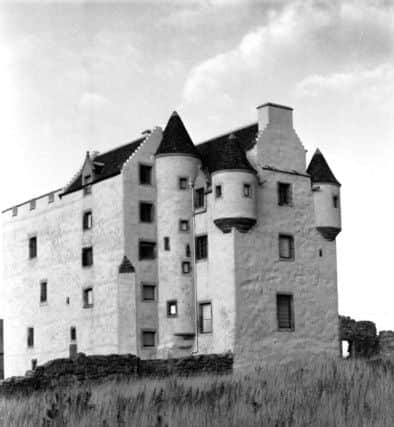Architect forced to sell East Lothian castle to pay back £350,000 of stolen charity cash
Ian Brash stole more than £350,000 from the Dr Robert Malcolm Trust (DRMT) while he was a trustee of the charity which helped provide financial assistance to British medical students and doctors.
Brash had been a trustee for the charity - which had been set up by a philanthropic relative - for more than 15 years before he began pilfering cash from the charity’s bank account.
Advertisement
Hide AdAdvertisement
Hide AdThe retired architect splashed out on an Alpha Romeo, two new Land Rovers and paid tens of thousands of pounds to fund deposits for buy-to-let properties for his children.


Brash, 66, also bought a wind turbine and paid off large vet bills with the embezzled charity cash.
Charity regulator OSCR became “concerned about the movement of funds” from the charity bank account to Brash’s personal account in 2012 and an investigation was set up.
Brash claimed he was using his own accounts to buy shares for the future benefit of the charity but failed to provide the regulator with any evidence.
The father-of-two is now having to sell the historic Category A-Listed Fa’side Castle, near Tranent, East Lothian, as he bids to raise funds to pay back the stolen charity cash.


The 15th century, four-storey castle has six bedrooms, four reception rooms and a Great Hall and is expected to be on the market over the coming weeks through a leading estate agents, for offers over £1.9 million.
Brash is also facing a possible custodial sentence after he admitted embezzling £358,832 from the Dr Robert Malcolm Trust between August 12, 2010 and September 10, 2014 when he appeared at Edinburgh Sheriff Court last year.
Sheriff Frank Crowe has twice deferred sentence on Brash to allow the shamed businessman time to sell his historic family home where he and wife Sue have lived for the past 30 years.
He is due to return to court for sentencing in April.
Advertisement
Hide AdAdvertisement
Hide AdSheriff Crowe heard an agreed narration into the facts of the case and was told the charity was set up April 1987 by Miss Janie Millar who had inherited around £1m from her uncle Robert Malcolm’s estate.
Miss Millar, a relative of Brash’s mother, transferred 20,000 GlaxoSmithKline shares to the charity account and advertised the charitable trust in the British Medical Journal and The Lancet.
Over the following years financial grants of between £250 to £1000 were made to between 10 and 15 applicants each year.
Miss Miller asked Brash to become a trustee for the charity 1989 and he set up an offshoot called Robert Malcolm Investments Ltd [RMIL] which was to be solely used as a trading arm to raise funds for the charity.
Miss Miller died in 2002 leaving Brash the sole trustee of the charity and four years later his children Vicki and Greig were also made trustees.
The charity bought a property in Windermere, Cumbria, for £172,018 in 1995 and after Brash had taken sole control of the charity’s finances the property was sold for £500,000 in 2010.
Brash then transferred most of the cash into the RMIL trading company account before he then began transferring large sums of cash into a personal share dealing account held in his and his wife Sue’s name.
The funds were then used to buy shares in various companies and the subsequent profits of those transactions were transferred into his own personal bank account.
Advertisement
Hide AdAdvertisement
Hide AdBrash claimed the charity cash had become “mixed up” with his own money as he spent tens of thousands of pounds on three cars, a wind turbine and deposits for five buy-to-let properties belonging to his two children.
The architect claimed he had invested the funds in property for the future benefit to the charity but when pressed by the regulators he could not provide any documentation backing this up.
After he had been caught Brash attempted to arrange a repayment plan over several years with OSCR but the regulator said “the offer could not properly be accepted”.
OSCR then reported the matter to the Crown Office and they subsequently passed on the details to Police Scotland’s Economic Crime Unit.
The court was also told the Dr Robert Malcolm Trust had made regular awards to medical students and in the period between 1992 and 1994 a total of £27,000 was handed out to 66 recipients.
But by the time Brash was in charge of the finances it was found that two students who received a payment of £2000 between them in 2011 were the last to benefit from the charity.
The DRMT bank account was closed down by RBS in 2013 with a closing balance of just £1270.
An OSCR spokesperson said: “OSCR opened its inquiry into this charity in 2012.
Advertisement
Hide AdAdvertisement
Hide Ad“Our inquiries into this complex case indicated suggested there had been criminal conduct, so in line with our published policies we made a report to the prosecuting authorities.
“Since then we have worked with the Crown Office Procurator Fiscal Service and Police Scotland to support the prosecution of Ian Brash.
“We were pleased to note the verdict in the case, which shows that criminality in Scottish charities will be investigated and dealt with appropriately.
“We are considering the future of the charity.”
Join our Facebook group Our Edinburgh to share images and news from and around the Capital